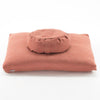Do you have hopes for the coming year? I do. I want everyone to get the vaccine; I want businesses to recover; I want people to feel safe, to feel free. Politically, I want things to change. In my own life, I have hopes for my family, my sangha, the work I do—in almost every area of my life, if pressed, I could tell you a way I think it could be better in 2021. There are some things that I want.
In Buddhism, though, wanting is kind of tricky. We’re told from the start, in the four noble truths, that (1) life is characterized by dukkha, or dissatisfaction, (2) dukkha is the result of desire, (3) the way beyond dukkha is the way beyond desire, and (4) there’s a way to do that (the eightfold path). “Desire,” here, feels like a big problem. And there is definitely a perspective in the Buddhist world that we should take all that at face value—that wanting things is always bad, always an obstacle, always something we need to go beyond. That’s one approach. A difficult one.
I was taught, in that second truth, that “desire” is an oversimplification, that what we’re really talking about is attachment. Doctrinally, that makes sense—attachment is one of the three poisons, after all (alongside aversion and ignorance). But what’s the distinction, really? Where does desire end and attachment begin?

There are different ways to unpack the idea of attachment, but in the case of what we want for 2021, there’s a simple test: what are your conditions?
I’ll offer a really simple example of how this works. I would like to win the lottery, or some equivalent; I suspect you would too. If, out of the blue, I received more money than I knew what to do with, I would be thrilled—I can instantly fill my brain with all the things I would do, the security I’d feel, the people I’d be able to help. So if you ask me if I want to win the lottery, on one very simple level, my answer is yes. I have that desire. But I don’t have any conditions placed on it; I can’t say, “If I don’t win the lottery, then I’ll be upset” (or “that will mean the world is unfair,” or “something inside me will break,” or whatever it may be). I don’t think I will win, and given the statistical probability of winning (especially for someone like me, who buys a ticket a couple times a year), there’s no reasonable action I can take to control it. So yes, I want it, but there are no conditions. I haven’t decided, “If not X, then Y.” I’m not attached.
We all have those conditions; we may not even be consciously aware of some of them. They’re like little bargains we make with the universe, little negotiations: if you give me this, then OK, but if not, well, we know what will happen. It’s a threat, but you’re threatening yourself, deciding in advance that if things don’t go your way, you’ll meet that with unhappiness. Or, in another version, you’re assigning meaning: if he doesn’t do X, then that means he’s such-and-such about him, or about our relationship. Maybe it’s about you: if I don’t get that promotion, then that means I’m a failure. Whatever it is, we’re deciding now how we will feel then, what it will mean then, how we will respond then. It’s in the contract—we’re pre-registering for dukkha.
Much—most—of what happens in the next year will be beyond your control. If that wasn’t clear to us before, 2020 spelled it out. There are things we want, even things we might fight for. And to that, I say, go for it. Want what’s best. And where you can help make that possible, whatever it is, put in the work. But right now, before the clock strikes midnight, put down your conditions. If you can’t let go of attachment, at least relax your grip a little. Meet 2021 as it is, as you are, ready for anything.
Happy New Year.

Author: Koun Franz
Koun Franz is a Montana-born Soto Zen priest who trained, taught, and translated in traditional monasteries in Japan. He is the guiding teacher of Thousand Harbours Zen in Halifax, Nova Scotia; his talks can be found on the their podcast.
A closet essential that keeps you toasty, and adds a bright pop of color to your casual attire. A beautiful handwoven, 100% cotton scarf made for cooler nights. Scarf measures: 62 x 22" with 3" fringe. Recommended to hand wash with cold water and lay flat to dry.
This Chakra Pendant Necklace is perfect for any meditator. Not only is it stunning but it helps you to be connected with your spiritual self no matter where you go and keep your chakras open. Made using a brass pendant, brass beads, a brass button to open and close, and brown waxed thread this necklace is perfect to layer with others or to stand on its own.
Add this statue to your garden and make a sacred space in your own backyard. This statue shows the Buddha using the Dhyana mudra. The touching thumbs are thought to symbolize the union and enlightenment of the feminine and masculine mind, body, and spirit. This mudra provides a calming energy for deep contemplation and reflection.
The Geometric Zabuton Set is part of our newest meditation cushion collection, where traditional zafu and zabuton designs are made with contemporary fabrics. A beautiful addition to your home, meditation center, or yoga studio space!





